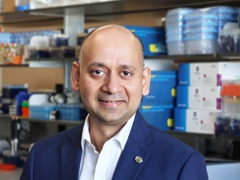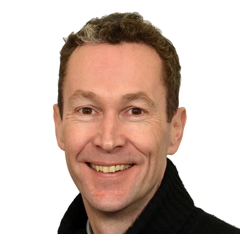Unlocking the unknown: the genetic trailblazers transforming rare conditions diagnosis
Rare conditions affect hundreds of millions of people globally. Two Manchester researchers are tackling the challenge of diagnosing rare genetic diseases to benefit patients around the world.

About rare genetic conditions
- Rare diseases affect fewer than 1 in every 2,000 people.
- Accurate diagnoses for rare conditions take 5 to 7 years on average.
- 80% of rare conditions have a genetic cause.
Rare conditions pose a global health challenge - one marked by delayed diagnoses, few effective treatments, and serious lifelong consequences for patients and families.
Although each rare condition affects a small number of individuals, collectively they impact over 300 million people worldwide - more than the population of the United States. There are over 7,000 known rare conditions, and this number continues to grow as science advances.
Over 90% of rare conditions have no approved treatment, and pharmaceutical companies often lack financial incentives to develop therapies for small patient populations, leading to a significant gap in care and innovation.
At the heart of efforts to tackle this are Professors Sid Banka and Bill Newman, two researchers driving advances that are transforming how rare conditions are understood, diagnosed, and ultimately treated. Their work, spanning fundamental genetic discovery and practical clinical innovation, is bringing clarity to conditions that have long gone undetected and untreated.
Why rare conditions need urgent solutions
Rare conditions often have a genetic cause and start early in life. Yet, for many, the journey to diagnosis takes years - if it happens at all. These conditions are frequently complex, involving multiple systems of the body. Because they affect relatively small numbers, research funding and resources are limited.

Professor Siddharth Banka
Sid is Professor of Genomic Medicine and Rare Diseases, Consultant Clinical Geneticist and Founding Clinical Director of the Manchester Rare Conditions Centre.
"There's an enormous unmet need in the rare disease community," says Professor Sid Banka, Professor of Genomic Medicine and Rare Diseases at The University of Manchester. "A diagnosis can change help not just medically, but also emotionally and socially. It gives families answers and direction, and it allows clinicians to make more informed care decisions."
What makes tackling rare conditions particularly challenging is the limited data available. The rarity of each condition means no single centre can collect enough information to study them effectively. This is why international collaboration, open genomic datasets and advanced technologies are crucial.
Manchester's role: from discovery to diagnosis
Manchester is helping to close this diagnostic gap through world-leading research. At the NIHR Manchester Biomedical Research Centre and Manchester Centre for Genomic Medicine, Professor Banka's team has been decoding areas of the genome once dismissed as 'junk DNA'.
Their studies have shown that mutations in non-protein coding regions, specifically, those forming structures called R-loops, can disrupt brain development and lead to previously undiagnosed neurodevelopmental conditions.
"These are genes we didn't previously understand or even look at," explains Professor Banka. "But we now know they play a crucial role in how the brain and other systems develop. It opens a whole new category of genetic conditions and, crucially, new routes to diagnosis."
Meanwhile, Professor Bill Newman, a Consultant in Genomic Medicine and Professor of Translational Genomic Medicine at The University of Manchester, has taken a different but complementary approach, bringing cutting-edge genetic testing to the bedside. His team led the development of a world-first rapid genetic test that identifies whether newborn babies are at risk of deafness from a commonly used antibiotic.

Professor Bill Newman
Bill is Professor of Translational Genomic Medicine in the Manchester Centre for Genomic Medicine at The University of Manchester and Honorary Consultant at Manchester University NHS Foundation Trust.
"This is personalised medicine in real time," says Professor Newman. "The test allows clinicians to make safer decisions for babies within the 'golden hour' of treatment. It's already being used across Greater Manchester, and is now being trialled nationally. This is the future of genetic testing in acute care."
These advances sit within a wider ecosystem of rare disease expertise, including the Manchester Rare Conditions Centre, which connects research and clinical care to improve outcomes for patients and families across the region.
Global reach, global responsibility
Both researchers emphasise that their work extends far beyond Manchester. Banka leads global partnerships, including long-standing collaborations with clinicians and researchers in India, such as Kasturba Medical College in Manipal. These partnerships build local capacity, accelerate diagnosis and improve care in regions where access to advanced testing may be limited.
"We simply can't do this work in isolation," says Professor Banka. "Rare conditions research must be global. The more we collaborate, the faster we can understand these conditions and help more people - wherever they live."
For Newman, international relevance comes from the test's potential to prevent avoidable disability in newborns - an issue not confined to the UK. "We're generating evidence that could support implementation in neonatal settings around the world," he explains. "Ultimately, it's about equity in healthcare access."
From the rare to the remarkable
What unites both researchers is a clear vision: to reduce the lengthy path to diagnosis, drive down health inequities and create systems where no one is left behind because their condition is too uncommon to understand.
"Every rare condition we study deepens our knowledge of human biology," says Banka. "And, often, those insights help us better understand more common diseases too."
Their combined work is a powerful reminder that investing in rare disease research isn't niche science: it's essential.
